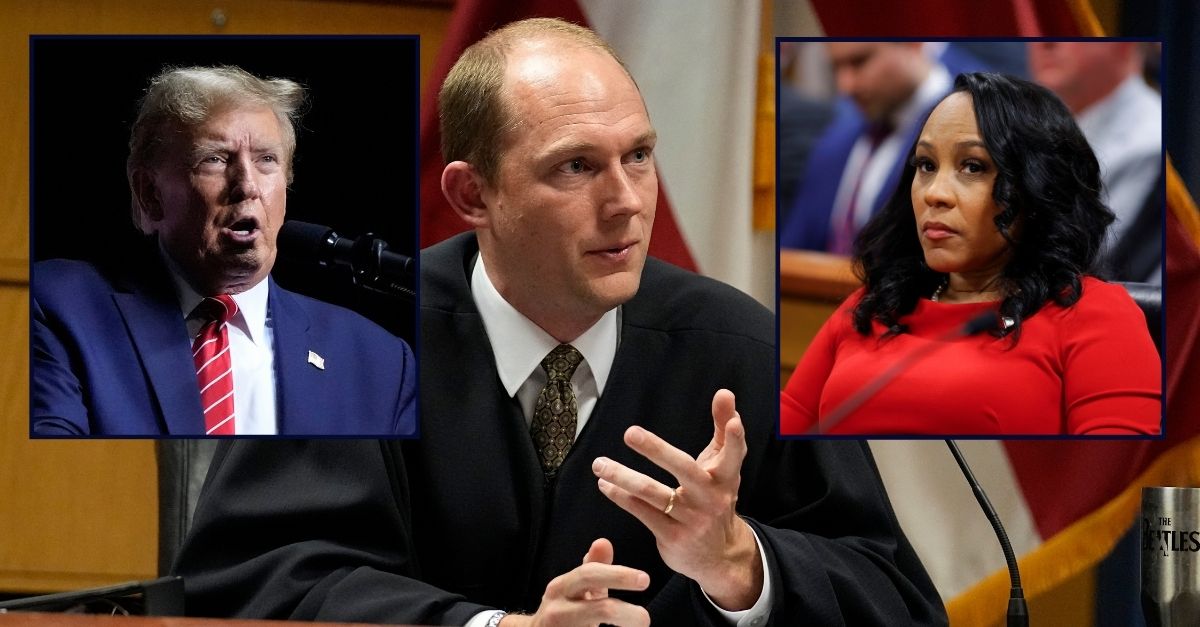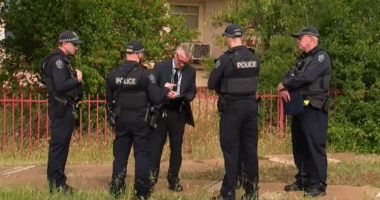Share this @internewscast.com

Main image: Fulton County Superior Judge Scott McAfee speaks in court, Tuesday, Feb. 27, 2024, in Atlanta. (AP Photo/Brynn Anderson, Pool); Inset left: FILE – Republican presidential candidate former President Donald Trump speaks, March 9, 2024, in Rome, Ga. (AP Photo/Mike Stewart, File); Inset right: Fulton County District Attorney Fani Willis looks on during a hearing on the Georgia election interference case, March, 1, 2024, in Atlanta. (AP Photo/Alex Slitz, Pool)
A Georgia judge has partially granted a defense motion to disqualify Fulton County District Attorney Fani Willis from the racketeering (RICO) and election subversion case against Donald Trump and others.
“”[T]he Court finds that the Defendants failed to meet their burden of proving that the District Attorney acquired an actual conflict of interest in this case through her personal relationship and recurring travels with her lead prosecutor,” Fulton County Superior Court Judge Scott McAfee wrote in the order, issued Friday morning. “[T]he established record now highlights a significant appearance of impropriety that infects the current structure of the prosecution team — an appearance that must be removed through the State’s selection of one of two options. The Defendants’ motions are therefore granted in part.”
McAfee denied “other alleged grounds for disqualification, including forensic misconduct.”
The forensic misconduct denial was related to the comments Willis made at the church
While not disqualifying, McAfee says Willis’s comments were “improper.”
From the ruling:
However, the speech did not specifically mention any Defendant by name. Although not improvised or inadvertent, it also did not address the merits of the indicted offenses in an effort to move the trial itself to the court of public opinion. Nor did it disclose sensitive or confidential evidence yet to be revealed or admitted at trial. In addition, the case is too far removed from jury selection to establish a permanent taint of the jury pool. As best it can divine, under the sole direction of Williams, the Court cannot find that this speech crossed the line to the point where the Defendants have been denied the opportunity for a fundamentally fair trial, or that it requires the District Attorney’s disqualification. But it was still legally improper. Providing this type of public comment creates dangerous waters for the District Attorney to wade further into.
The ruling caps a three-month effort by the defense to have the district attorney and her office removed from the case over various misconduct allegations.
The court’s order will allow the case to move forward but the length of time spent dealing with the disqualification motion has been a substantial boon to the 45th president amid his multiple legal battles and the looming election rematch with President Joe Biden. A trial date in the matter is still possible but unlikely before November.
In the Jan. 8 motion to disqualify, co-defendant Michael Roman and his attorney, Ashleigh Merchant, alerted the world to the romance between Willis and special prosecutor Nathan Wade — along with allegations of nepotism and self-dealing. Roman was a senior staffer in Trump’s 2020 reelection campaign. Prosecutors allege he was part of the plot to send a slate of fake electors to vote for Trump.
The court’s decision hinged upon the legal standard of review applicable to disqualifying a prosecutor in Georgia. McAfee, during closing arguments, signaled the standard was likely to be dispositive.
In motions, Trump’s lead attorney in Atlanta, Steve Sadow, accused the district attorney of using the lengthy speech to make “inflammatory extrajudicial racial comments” and accused her of improperly stoking “racial animus” to influence would-be jurors. During closing arguments, the defense accused Willis of using the church speech to deflect attention away from the scandal over her relationship with Wade.
Read McAfee’s ruling here.














